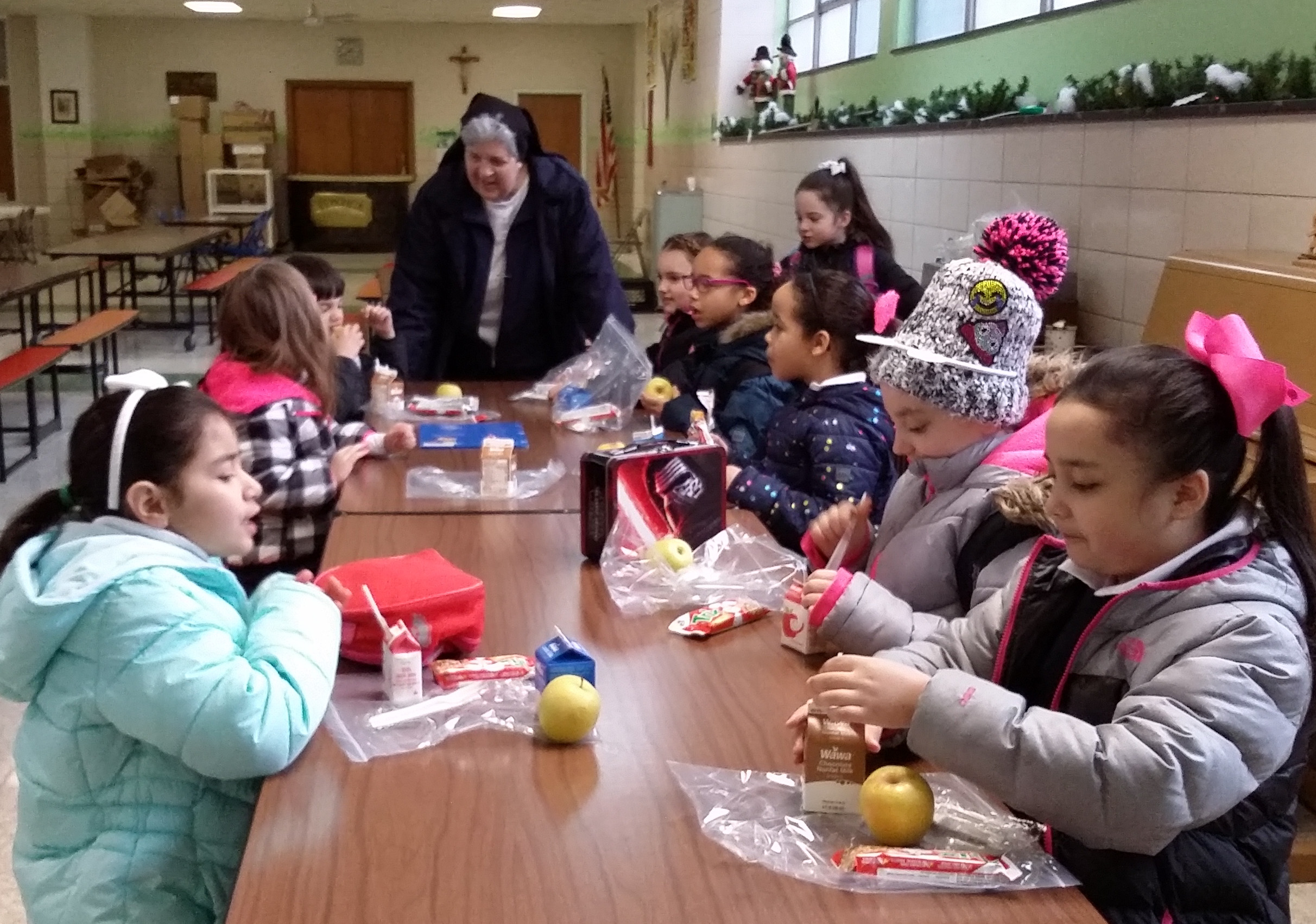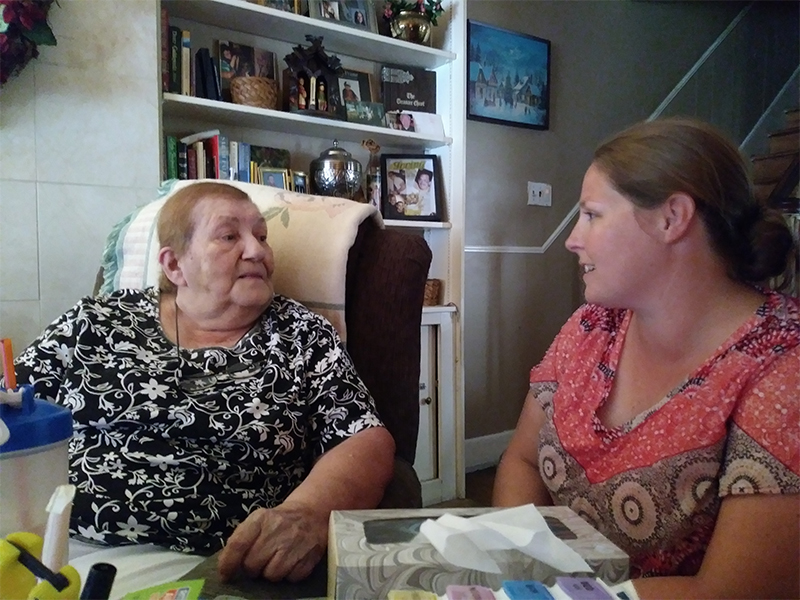
St. Monica Parish School principal Sister Regina Matulka, IHM chats with students as they enjoy free daily breakfasts before class, March 16, 2018. The meals are part of a federally funded program managed locally by the archdiocese’s Nutritional Development Services (NDS), which now faces new challenges to serve its clients amid the coronavirus pandemic. (Gina Christian)
As officials seek to contain the spread of the coronavirus, archdiocesan Catholic Social Services (CSS) agencies are striving to do the same, while still providing vital resources that benefit thousands of individuals and families throughout the five-county Philadelphia area.
“We are working closely with archdiocesan initiatives that are tracking CDC (Centers for Disease Control) guidance, as well as our governmental partners,” said James Amato, secretary for archdiocesan Catholic Human Services (CHS). “Our goal is to ensure the well-being of our staff and those we are privileged to serve.”
At this time, there are no confirmed cases of coronavirus among Archdiocese of Philadelphia employees.
[hotblock]
The closure of area schools directly affects the federally funded school meal programs that CHS’s Nutritional Development Services (NDS) has operated for decades, but “at this time (the agency) will continue to make deliveries to the sites we serve that are open,” said executive director Lizanne Hagedorn.
Like other meal program sponsors, she said, “NDS … is seeking a waiver to serve meals at locations when schools, child care centers and afterschool programs are closed.”
Montgomery County poses “a new challenge we are facing,” she said, since on March 12 Gov. Tom Wolf ordered schools, community centers, gyms and entertainment venues to close for 14 days.
The NDS team is also monitoring “disruptions along the supply chain” that would prevent the agency from delivering food.
She noted that “the fluidity of the situation is challenging” in terms of “putting together a comprehensive plan,” since “circumstances change by the hour.”
Hagedorn and her colleagues “feel there is enough food in the cupboards” of that NDS’s numerous food pantries, which are located throughout the region. However, “we are monitoring this closely,” she added.
Food supplies are also a concern for staff of archdiocesan Catholic Housing and Community Services (CHCS), which provides a continuum of care – including senior centers, parish-based eldercare and affordable senior living – to thousands of the area’s older adults.

JoAnne McCarthy (left) of Bristol discusses her at-home senior care services with archdiocesan social worker Kelly Amenhauser, Sept. 11, 2o18. In response to the coronavirus pandemic, the Archdiocese of Philadelphia has suspended home visits to elderly clients in Montgomery County, but continues to (Photo by Gina Christian)
“We are trying to balance keeping clients and staff healthy, and at the same time making sure that our seniors have their needs met,” said CHCS executive director Heather Huot. “Many rely on us for a meals and support.”
Huot said that parish eldercare workers in Montgomery County have stopped making home visits for the two-week period designated by the state. The agency is now reaching out to clients by phone. Parish eldercare and in-home support workers in other counties are still making home visits, but only after first checking with clients to ensure they feel well enough.
CHCS’s senior centers remain open, Huot said, noting that the agency remains “in constant communication with the Philadelphia Corporation for Aging” on this point. Large celebrations at the centers have been cancelled for the time being, and CHCS is “taking direction from the city of Philadelphia and the Department of Health” regarding possible closures of the centers, she said.
Should the centers close, “we will still provide meals and social services to (them) in a modified form,” Huot added.
At CHCS’s affordable senior housing sites, group meetings and activities have been suspended, and a community wellness center at the agency’s St. John Neumann Place II location in South Philadelphia has been closed. On-site social workers at the facilities continue to work while “taking precautions and educating residents about how to contact them” if seniors feel unwell.
Diligent adherence to Centers for Disease Control (CDC) guidelines is guiding another archdiocesan agency that supports vulnerable individuals.
“As always, the health and safety of our clients, employees and families are our utmost priority,” said Francis Swiacki, executive director of CSS’s developmental programs division, which broadly cares for intellectually and developmentally disabled adults.
Rigorous handwashing, cleaning and disinfecting have been implemented throughout program sites. Employees displaying fever, cough or shortness of breath will be required to stay home until fully recovered and without symptoms for 24 hours, said Swiacki.
In addition, visitors to program sites must now complete a brief screening process for the virus to identify recent exposure or symptoms. If these are present, access to the facilities will be denied.
Staff are being discouraged from non-essential travel to CDC-designated Level 3 affected areas. Employees currently traveling to such locations (which include China, Iran, South Korea and most of Europe) will be required to complete a 14-day incubation period at home. Archdiocesan human resources staff will interview all employees who are planning international travel.
PREVIOUS: Archdiocese closes schools, PREP to prevent coronavirus
NEXT: Despite coronavirus, faithful turn out for Sunday Mass


Share this story